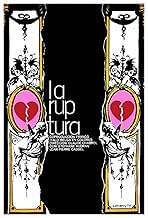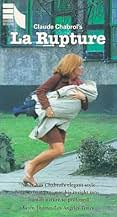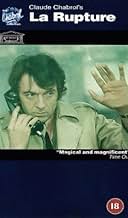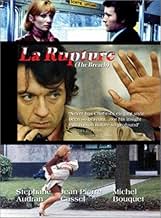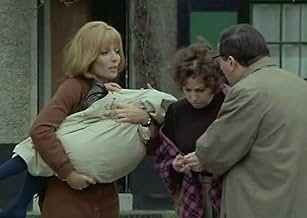NOTE IMDb
7,2/10
2,1 k
MA NOTE
Charles Régnier, père de famille toxicomane, blesse son jeune fils dans un accès de rage. Sa femme Hélène prend peur et le quitte. Désireux de récupérer, le père de Charles tente de récupére... Tout lireCharles Régnier, père de famille toxicomane, blesse son jeune fils dans un accès de rage. Sa femme Hélène prend peur et le quitte. Désireux de récupérer, le père de Charles tente de récupérer son petit-fils.Charles Régnier, père de famille toxicomane, blesse son jeune fils dans un accès de rage. Sa femme Hélène prend peur et le quitte. Désireux de récupérer, le père de Charles tente de récupérer son petit-fils.
- Réalisation
- Scénario
- Casting principal
- Récompenses
- 1 nomination au total
Margo Lion
- Mme Humbert - la première parque
- (as Margot Lion)
Avis à la une
The Breach (aka La rupture) is a film made by celebrated French director Claude Chabrol in the middle of his golden period at the turn of the 70's. Like most of his other films from this time, it is a psychological thriller that is more interested in character interactions than in suspense. While it is true that there is some of that present here too, there isn't a lot and the film only truly moves into thriller territory in its final quarter. In fact, the switch is quite jarring and has left some thinking it doesn't fit very well alongside what has gone before. I kind of liked the ending though, it isn't especially realistic and even becomes a bit surreal, yet the story on the whole has got an oddness about it generally, typified by the unsettling and somewhat off-centre musical score used throughout. The story revolves around a woman called Hélène who is the wife of a rich layabout drug addict. One day he attacks her and their child, leaving the boy hospitalised. Hélène attacks him back leaving him with a head injury. His rich father hires a sleazy friend of the family to befriend Hélène with the objective of incriminating her, leading to a divorce that would favour his son.
Like a lot of Chabrol's best works this one stars his wife, the radiant Stéphane Audran who is, once more, extremely good and sympathetic as Hélène, Jean-Pierre Cassel is also impressive as her manipulative 'friend', while it would be remiss not to mention Catherine Rouvel also, who is a lot of fun as his highly sexed girlfriend who pleasingly spends most of the film in a state of undress (ooh la la). In fact, there is a plethora of oddball side characters in this one, most live in the boarding house where the majority of the action revolves around, such as three old ladies who continually play with Tarot cards, a mentally-backwards girl and an overly-dramatic actor. On top of this, it's nicely photographed, especially in the surreal park scene towards the end where things get a little trippy. The film criticises the bourgeois, with the rich grandparents acting like it is their right to dictate events purely on account of their financial strength. But the film works mainly as an off-kilter psychological drama/thriller, underpinned by fine acting and some good direction.
Like a lot of Chabrol's best works this one stars his wife, the radiant Stéphane Audran who is, once more, extremely good and sympathetic as Hélène, Jean-Pierre Cassel is also impressive as her manipulative 'friend', while it would be remiss not to mention Catherine Rouvel also, who is a lot of fun as his highly sexed girlfriend who pleasingly spends most of the film in a state of undress (ooh la la). In fact, there is a plethora of oddball side characters in this one, most live in the boarding house where the majority of the action revolves around, such as three old ladies who continually play with Tarot cards, a mentally-backwards girl and an overly-dramatic actor. On top of this, it's nicely photographed, especially in the surreal park scene towards the end where things get a little trippy. The film criticises the bourgeois, with the rich grandparents acting like it is their right to dictate events purely on account of their financial strength. But the film works mainly as an off-kilter psychological drama/thriller, underpinned by fine acting and some good direction.
LA RUPTURE is one of Claude Chabrol's most devastating critiques of the bourgeoisie and it's one of his finest films. It's about a working wife and mother fighting for custody of her small son after the boy's drug-addicted father has attacked them, only to find her husband's rich parents have hired a sleazy, corrupt investigator to destroy her reputation. The film isn't flawless; there are too many extraneous and eccentric characters but the main plot is beautifully handled, (it's based on a novel by Charlotte Armstrong), and Stephane Audran as the wife and Jean-Pierre Cassel as the investigator are both terrific. Of course, you may think Chabrol's decision to treat such a serious subject as domestic violence purely as a thriller a little tasteless but fundamentally this isn't really a film about domestic violence at all but an almost Dickensian study of evil; the bourgeoisie parents are distinctly rotten, the investigator even more so. If the film were more 'realistic' it might be unbearable; there's a scene of potential child sex abuse, and the child is mentally handicapped, that is almost too bizarre to be really disturbing and the film gets very bizarre towards the end. However, even with its convoluted plot it works superbly both as an outright thriller and as a scathing indictment of a highly amoral society.
6sol-
Intent on winning custody of their grandson who their son injured while stoned, an upper class couple set out to discredit and defame their daughter-in-law in this odd thriller from Claude Chabrol. Stéphane Audran plays the daughter-in-law, however, the majority of the film is curiously not told from her point-of-view but rather the perspective of a man hired to discredit her, played by Jean-Pierre Cassel. As such, the film does derive any juice from Audran wondering whether or not she is going insane (a la 'Gaslight'), which would not necessarily be a problem, except that Cassel's schemes are so strange and convoluted that it is obvious that they will fail before he even puts them into action. His attempts to spread gossip around the boarding house where Audran is staying are fairly credible. At his most incompetent though, Cassel tries to force Audran to eat a drugged candy (!) while his most bizarre plan involves his girlfriend wearing a wig and fondling Audran's landlady's mentally challenged daughter, expecting that the girl will mistake the wigged woman for Audran! With a perfectly terse music score and lots of fluid camera movements, 'La Rupture' still remains very watchable despite the messy plot, and the LSD-induced scenes towards the end need to be seen to be believed. There is also a lot of memorable weirdness throughout, such as Cassel's girlfriend always being nude (or partially naked) and her fondling scene, complete with an X-rated Satanic film projected in a darkened room might well rate as the very strangest sequence that Chabrol ever committed to celluloid.
When the aspirant writer Charles Régnier (Jean-Claude Drouot), who is drug addicted and mentally ill, throws his four-year-old son Michel against the kitchen wall in a rage attack, his wife Hélène (Stéphane Audran) defends her son and herself, hitting Charles several times with a frying pan. Her neighbor takes Hélène and Michel to the hospital and the boy must be interned with a broken leg and concussion. Hélène works as bartender and has supported her family alone since her wealthy father-in-law Ludovic Régnier (Michel Bouquet) hates that Charles has married with someone uneducated from the lower classes. Hélène finds a low-budget boarding house nearby the hospital and rents a simple room to be close to her beloved son. Further, she hires a lawyer to get the divorce and the custody of Michel. Ludovic is advised by his lawyer that Hélène would win the custody and he hires the lowlife Paul Thomas (Jean- Pierre Cassel), who is totally broken and desperately needs money, to find dirt evidences against the Hélène. The vile Paul lures Hélène saying that he is very ill and moves to the boarding house. After a while, he does not find anything against Hélène, and he decides to fabricate evidences to destroy her reputation. But things do not work as planned.
I have seen many excellent films of the master of suspense Claude Chabrol, but "La Rupture" is probably the best film I have seen of this French director and a masterpiece of human cruelty and sordidness. Chabrol usually criticizes the bourgeois class in his movies, and the fight between classes is shown in "La Rupture", with a sharp demonstration of how destructive the prejudice and the power of money may be. The plot presents wealthy characters; some of them are just glanced like the actor in the boarding house but everyone has an important role in the dark story. Paul Thomas is among the most despicable villains I have ever seen, with his corrupted soul. I could write pages about this masterpiece but instead, I prefer to recommend to viewers of good taste to see it. My vote is ten.
Title (Brazil): "Trágica Seoaração" ("Tragic Separation")
Note: On 07 December 2024, I saw this film again.
I have seen many excellent films of the master of suspense Claude Chabrol, but "La Rupture" is probably the best film I have seen of this French director and a masterpiece of human cruelty and sordidness. Chabrol usually criticizes the bourgeois class in his movies, and the fight between classes is shown in "La Rupture", with a sharp demonstration of how destructive the prejudice and the power of money may be. The plot presents wealthy characters; some of them are just glanced like the actor in the boarding house but everyone has an important role in the dark story. Paul Thomas is among the most despicable villains I have ever seen, with his corrupted soul. I could write pages about this masterpiece but instead, I prefer to recommend to viewers of good taste to see it. My vote is ten.
Title (Brazil): "Trágica Seoaração" ("Tragic Separation")
Note: On 07 December 2024, I saw this film again.
10pyamada
The parents of Charles, the loser and addict husband, who are impossibly bourgeoise, begin the cycle of dishonesty and class warfare, in their attempt to gain custody of the child. Helene is followed, harassed and finally drugged; her fear, paranoia and her hallucinations are "real" and very powerful. This is Chabrol at his best, giving a scathing critique of the whims and overall avarice of the bourgeoise and upper class while showing you the terrible fate of a very mortal character who is trying to escape from the mistake of marrying wealth and position.
Le saviez-vous
- AnecdotesClaude Chabrol once stated that the bus scene where Hélène (his wife Stéphane Audran) tells her family's story to the lawyer (Michel Duchaussoy) was the occasion when he finally thought that Stéphane had become an actress.
- Citations
Opening Title Card: [from the French] But what thick night suddenly surrounds me? JEAN RACINE
- ConnexionsReferences Les Géants de l'Ouest (1969)
Meilleurs choix
Connectez-vous pour évaluer et suivre la liste de favoris afin de recevoir des recommandations personnalisées
- How long is The Breach?Alimenté par Alexa
Détails
- Durée2 heures 4 minutes
- Mixage
- Rapport de forme
- 1.85 : 1
Contribuer à cette page
Suggérer une modification ou ajouter du contenu manquant

